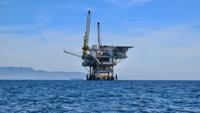
Whitmer
LANSING, Mich. - A pipeline that transports more than 20 million gallons of oil a day across a section of Michigan has sparked a complex legal and diplomatic battle as Gov. Gretchen Whitmer tries to shut it down while Canada says its eastern provinces depend upon the line for their energy security.
“A shutdown would cause massive revenue losses and potentially significant job losses in the energy sector in Alberta and Saskatchewan, while at the same time severely disrupting the supply and increasing the price of fuel across Quebec and Ontario,” Canada says in a brief filed in federal court. Michigan’s attempt to close Enbridge’s Line 5 as it crosses the Straits of Mackinac violates a 1977 treaty prohibiting states or provinces from hindering the transportation of oil and gas across the border, Canada adds.
The Trump Administration has also weighed in against Michigan, saying federal law preempts the state’s attempt to justify a shutdown on safety grounds. Gov. Whitmer campaigned on halting the flow of oil through Michigan and filed a lawsuit against Enbridge as soon as she entered office in 2019, claiming the 72-year-old pipeline was vulnerable to damage and corrosion and could cause a catastrophic oil leak in Michigan waters.
Whitmer is supported by Indian tribes, environmental groups like the National Wildlife Foundation and a number of Democrat-run states. Those other states argue the “public trust” doctrine guards their power to protect land under waterways within state borders. Michigan cites a 2010 spill from another Enbridge pipeline into a tributary of the Kalamazoo River as well as a 2018 incident when a boat anchor dented Line 5.
Enbridge says federal law controls how pipelines are operated and the state’s environmental arguments ring hollow, anyway. The Michigan Public Service Commission acknowledged in a 2023 report that alternatives, such as different pipeline routes or shipping the oil by tanker or rail, would present greater environmental risks than continuing to transport oil through an upgraded Line 5.
Michigan environmental officials also acknowledged shutting the pipeline down would result in higher greenhouse gas emissions since demand for oil and propane wouldn’t go away but it would have to be transported in more energy-intensive ways. The state has already approved Enbridge’s plan to encase the four-mile section of Line 5 running through the Straits of Mackinac in a concrete tunnel beneath the lake bed.
Line 5 transports 540,000 barrels of light and synthetic crude from western Canada to eastern Canada. The Toronto airport relies on refineries served by Line 5, and it supplies half of Quebec’s refinery feedstock. The pipeline also is the main source of natural gas liquids to produce propane in entire Great Lakes region on both sides of border.
The U.S. Supreme Court may cast the deciding vote as it considers whether the Whitmer administration improperly gamed the system to keep its lawsuit in its own courts instead of federal court. The state actually filed two lawsuits against Enbridge, but agreed to put one of them on hold while it fought Enbridge’s efforts to remove the second to federal court. When Enbridge won that fight, Michigan dismissed the second suit and then argued the 30-day deadline for seeking removal of the first suit was over.
The Sixth Circuit Court of Appeals agreed, but the Supreme Court has agreed to hear an appeal. In a brief before the high court, the Trump Administration says Michigan justifies its demands by citing Supreme Court precedent establishing state sovereignty over the land beneath state waters. But a statute gives the federal government exclusive power to regulate the safety of interstate pipelines, the Trump administration says.
“Michigan is enforcing its own safety standards—in the guise of the public trust doctrine and the easement conditions—to shut down Line 5 to protect the environment and concomitant concerns on human health and the economy,” the government says. “Michigan has not even attempted to offer a non-safety rationale for its actions.”
Line 5 continues to move oil as the legal fight rages in U.S. courts. Canada and the U.S. are also discussing a diplomatic solution, under rules laid out in the 1977 pipeline treaty between the two nations.








